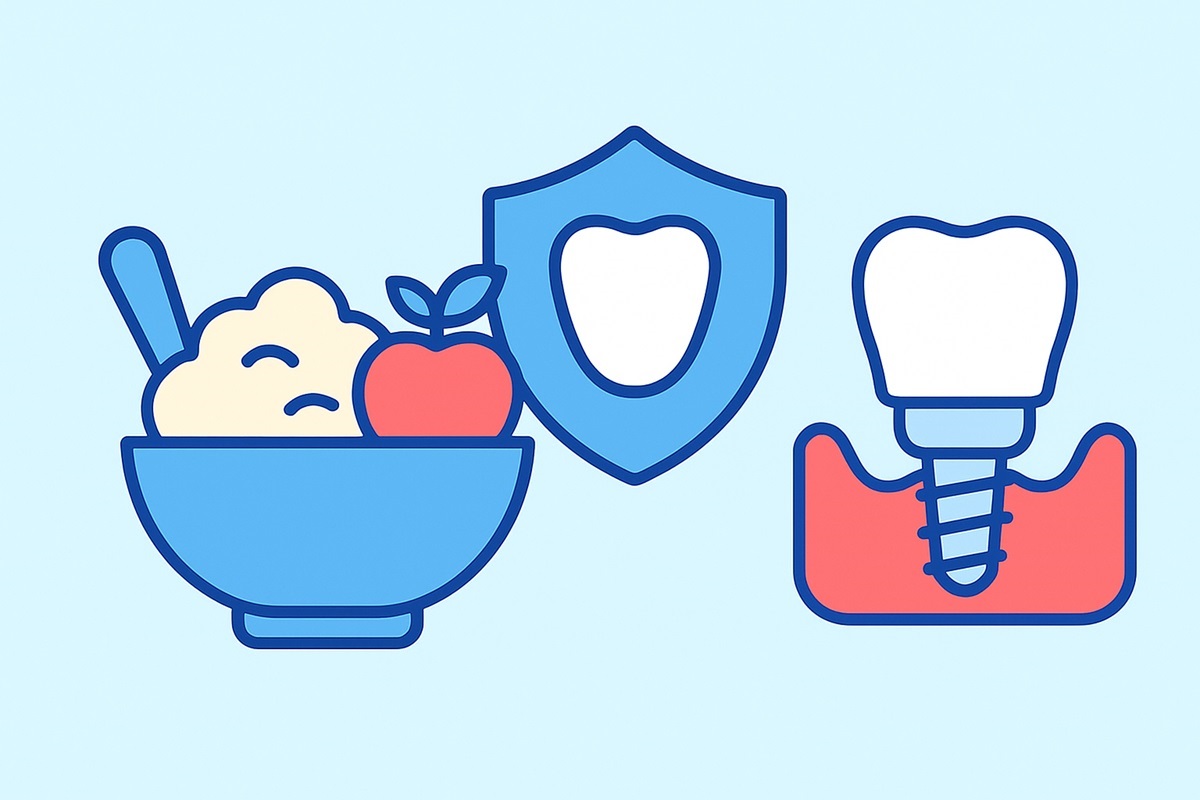Getting dental implants can feel like a big change, and it’s normal to wonder how your daily habits, like eating, will adjust. Patients often ask What can I eat after dental implant surgery? That concern is completely valid. At Rockville Dental Arts, we believe that thoughtful aftercare, especially when it comes to food choices, can make all the difference in your comfort and recovery.
The period following surgery is all about healing. And your diet plays a major role. Whether you’ve already received your implants or are planning for Dental Implants Rockville MD, the way you eat in the days and weeks after treatment helps protect the implant site, avoid infection, and support tissue growth.
Why Food Matters After Implants
Right after implant surgery, the tissues around the implant are delicate. Your gums, bone, and nerves need time and protection to adjust and rebuild. Eating the wrong textures or temperatures too early can lead to complications like swelling, pain, or even implant failure. Choosing the right types of meals not only keeps you nourished but encourages stability in the surgical area.
Eating carefully also reduces jaw strain and minimizes bacteria buildup. And that starts with picking foods that are soft, nutrient-rich, and easy on your mouth.
Day 1 to Day 2: Liquid and Cool Foods
The first 48 hours are the most sensitive. During this time, only choose foods that are very soft, lukewarm, or cold. Think soothing and gentle, but still nourishing.
Best options include:
- Smoothies (without seeds or chunks): Packed with fiber, vitamins, and protein from ingredients like banana, avocado, yogurt, or protein powder.
- Applesauce: Sweet, soft, and easy to swallow without any chewing.
- Lukewarm broths: Chicken or vegetable broth gives hydration and salt balance without being heavy.
- Mashed potatoes (no skin or chunks): Starchy and filling but smooth enough not to stress the implant site.
- Plain yogurt: Probiotic-rich and mild, it soothes the gums and supports gut health.
- Gelatin or pudding: Gentle, smooth, and easy to consume with minimal jaw movement.
Avoid sipping through straws, as the suction can pull on the clot protecting the implant.
Day 3 to Day 7: Slowly Adding Variety
As the swelling subsides, you may feel ready for more variety. At this stage, it’s safe to try foods that are soft but require minimal chewing. Just avoid anything crunchy or spicy.
Soft meal ideas:
- Oatmeal or cream of rice: Easy to eat warm cereals that provide lasting energy and fiber.
- Scrambled eggs: High in protein and soft enough to chew without pressure.
- Boiled pasta (well-cooked and plain): Tender and filling, easy on the teeth.
- Cooked carrots or zucchini: Steamed or boiled until soft, loaded with vitamins.
- Soft-cooked fish like cod or tilapia: Flaky, mild, and easier to chew than meat.
If you’re unsure whether something’s safe, speak with your Dentist Rockville MD, for a tailored recommendation. Timing and texture tolerance can vary slightly from patient to patient.
Foods to Avoid After Implant Surgery
To protect your implant site and prevent complications, skip any food or habit that puts pressure on your gums or introduces bacteria.
Avoid the following:
- Hard or crunchy foods: Nuts, seeds, crackers, toast, and popcorn can damage tissue and disrupt healing.
- Sticky items: Chewy candies or gum can stick to surgical areas and pull at the implant.
- Hot soups or drinks: High heat may inflame the tissues around the implant.
- Spicy or acidic dishes: These can irritate and inflame healing gums.
- Alcohol and tobacco: These delay healing, reduce blood flow, and increase the risk of infection.
Spacing terms like “gum protection,” “post-op dental care,” and “surgical site healing” together with “implant recovery” improves the clarity and semantic closeness of ideas, creating a logical connection through cosine similarity in how we explain diet choices after implants.
Supporting Healing Through Balanced Meals
Sticking to soft food doesn’t mean skipping nutrition. Your body needs fuel for repair. The better your nutrition, the smoother your recovery.
Helpful nutrients and where to find them:
- Protein for tissue repair: Eggs, tofu, soft fish, protein-rich smoothies
- Vitamin C for immune health: Mashed sweet potatoes, pureed fruits
- Vitamin A for cell repair: Steamed spinach, carrots, and egg yolks
- Calcium and magnesium for bone strength: Yogurt, cottage cheese, soft tofu
Staying hydrated is just as important. Water supports circulation, reduces dry mouth, and helps flush out bacteria.
Week 2 and Beyond: Transitioning Back Gently
Once your dentist confirms that your gums are healing properly, you can begin returning to firmer foods. Keep chewing away from the implant site and continue avoiding sharp, crunchy textures.
Good reintroduction foods include:
- Soft bread without crusts
- Cooked chicken (shredded)
- Soft rice dishes
- Baked apples or pears
- Tender meats in stews
It’s important to chew slowly and listen to your body. If something feels uncomfortable or causes soreness, wait a few more days before trying again.
What Can I Eat After Dental Implant Surgery? Let’s Make It Easy
To recap, what can I eat after dental implant surgery? Start with soft, smooth, and cool foods. Gradually move toward warm, easy-to-chew meals as your comfort improves. Focus on nourishment without putting your healing at risk.
Recovery isn’t about rushing, it’s about protecting the investment you’ve made in your smile. Food plays a bigger role than most realize, which is why we guide our patients carefully from day one.
Take the Next Step Toward Safe, Strong Healing
At Rockville Dental Arts, our care doesn’t stop after surgery. We help patients stay comfortable, informed, and confident at every stage of their implant journey.
If you’re unsure about your next meal, or you’d like expert advice on your healing timeline, our team is ready to help.
Call now to schedule your follow-up visit or request a recovery consultation today. Your comfort is our commitment.

